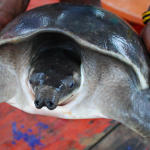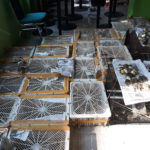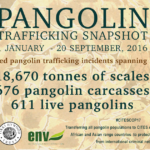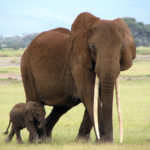Article courtesy of Dr Chris R. Shepherd, Regional Director, TRAFFIC Southeast Asia
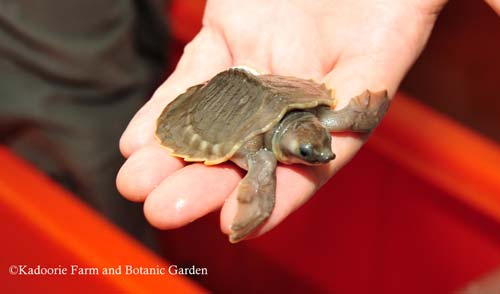
Kuala Lumpur, Malaysia, 6th February 2014 — Over 2,000 smuggled Pig-nosed Turtles seized in Hong Kong last month have made the long trip home to Indonesia where authorities have foiled the trafficking of thousands more of these sought-after turtles since early January.
The Pig-nosed Turtles repatriated on Tuesday were part of an original seizure of over 2,754 turtles by the Hong Kong Agriculture, Fisheries and Conservation Department on 12th January. Sadly, some of the baby turtles did not survive the smuggling attempt; survivors were cared for by the Kadoorie Farm and Botanic Garden before being flown to Jakarta.
It is extremely troubling to note that this case represents only a quarter of the 11,122 Pig-nosed Turtles reported to have been confiscated in Indonesia and Hong Kong in just the first month of 2014. This figure includes 2,968 Pig-nosed Turtles seized in Jakarta’s Soekarno-Hatta Airport on 7th January and 5,400 more in Papua province shortly before that.
The Pig-nosed Turtle (Carettochelys insculpta) is listed as Vulnerable by the IUCN Red List of Threatened Species. While threatened by habitat loss and collection for local consumption in Papua, the turtle’s greatest threat remains illegal trade for the international pet market.
The turtles are listed in Appendix II of CITES and are protected in all three range States — Australia, Indonesia and Papua New Guinea — making any international trade illegal. However, TRAFFIC’s research has revealed that thousands of Pig-nosed Turtle hatchlings continue to be collected for the trade. Dr. Chris R. Shepherd, Regional Director for TRAFFIC in South-East Asia, explains that the illegal trade is aided by poor regulation of laws, weak enforcement and poor governance.
“The numbers are damning for Pig-nosed Turtles, and for Indonesia, which continues to be one of the world’s most significant hubs of illegal wildlife trade.”
Although authorities in Indonesia traced one shipment to an address in Jakarta, including a contact number, they have yet to make any arrests. Similarly, no arrests have been made in Hong Kong, which is fast turning into the preferred destination for Pig-nosed Turtle traffickers.
In recent years Indonesia stopped two Hong Kong bound shipments of Pig-nosed Turtles – one carrying 687 turtles last April and another with 3,500 turtles in February 2010. In October 2011, Hong Kong seized an Indonesian shipment of 800 Pig-nosed Turtles.
“While the seizures demonstrate that authorities are vigilant, how long are we to sit and watch this cycle of seize-and-return? There is little hope for the Pig-nosed Turtle if we don’t see a more co-ordinated and concerted effort by both Indonesia and Hong Kong to address the main players in the demand and supply of these turtles.”
TRAFFIC calls on Indonesia to track down the individuals perpetuating the large-scale collection and trade in Pig-nosed Turtles and put an end to their business. TRAFFIC would also like to see Hong Kong investigate the importers and businesses that receive and illegally sell these turtles to consumers.

